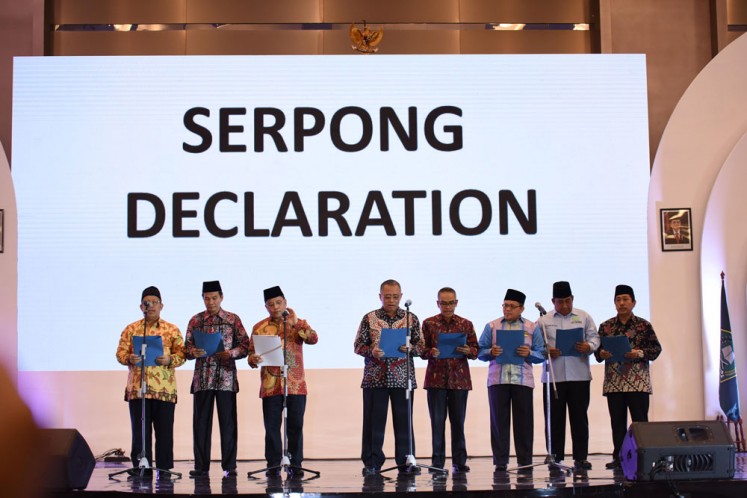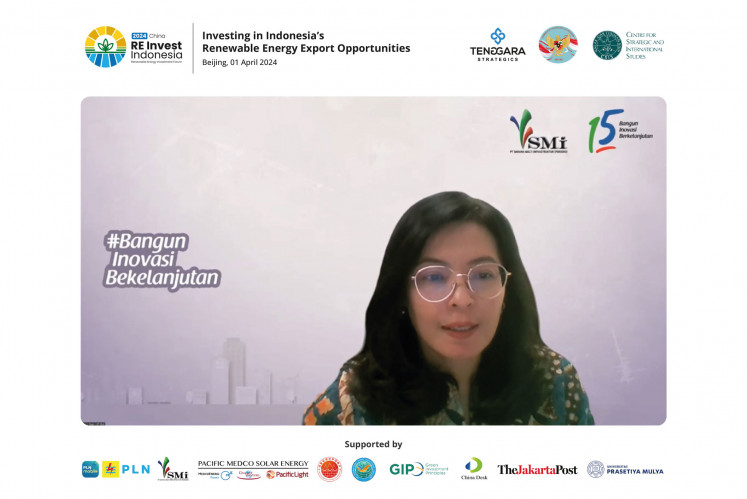Indonesia promotes moderate Islam in International Islamic Education Expo
Change Size
 Religious Affairs Minister Lukman Hakim Saifuddin.
Religious Affairs Minister Lukman Hakim Saifuddin.
I
slamic education in Indonesia must always preserve the tradition of combining both textual-based as well as rational academic approaches, which have been passed down by scholars of old and have resulted in a compassionate and moderate Islam in the country, says Religious Affairs Minister Lukman Hakim Saifuddin.
“What we must observe is how academic tradition since back in the past, which was developed by our predecessors, is always based on texts that are maintained as best as possible, but also they are synergized together with an academic tradition that emphasizes reason and context,” he said on Tuesday.
Speaking at the opening of the International Islamic Education Expo in South Tangerang, Banten, the minister said Islamic education in Indonesia should pursue a middle path, as siding too much with one of the academic approaches and abandoning the other would be dangerous. Adopting a textual-based approach alone and negating reason would leave students unable to respond to the challenges of the times, he said, while too much emphasis on reason in understanding Islam would lead students to become too liberal and free.
He added that although there were some Islamic education institutions that had gone to an extreme in deifying one academic approach over the other, most of the Islamic schools in Indonesia had sensibly merged the two academic approaches and as a result had created a situation in which the country can see Islam as it is supposed to be, which is Rahmatan lil Alaamin, or a mercy for the whole of mankind.
“We are grateful that our predecessors have wisely synergized these two approaches, not to have them clash against one another, but to complement one another. This is the responsibility of all of us together: to ensure Islamic education is able to always preserve these two approaches, which are both good,” he said.
The International Islamic Education Expo, held from Nov. 21 to Nov. 24 by the Religious Affairs Ministry, is aimed at promoting Islamic studies in Indonesia among the domestic and international community and the potential that Indonesia has to become an Islamic study destination. The Expo is being attended by important Muslim scholars and researchers from home and abroad, who will be holding talks and discussions on the topic of Islamic education.

Before the event was officially opened by the religious affairs minister, the audience of around 4,000 people witnessed the reading of the Serpong Declaration read out on stage by representatives of Indonesia’s Islamic mass organizations as well as leaders of some of Indonesia’s Islamic universities. The declaration was a symbolic vow of commitment to develop Islamic education as an agent of change.
“The Serpong Declaration is a commitment of our effort to make our life, not just in religious terms, but our lives as a nation – better. This is our effort to make Islamic education improve the future of our civilization,” Lukman said.
The minister also thanked all the parties that helped established and shape Indonesia’s Islamic education institutions, which have made the country one of the world leaders in Islamic education.
Global Islamic education
Compared to other Muslim-majority countries, Indonesia has more Islamic educational institutions under the supervision of the Religious Affairs Ministry, starting from madrasa (around 75,000 institutions), pesantren (28,000), to Islamic higher education institutions (600).
Up to 90 percent of these institutions, the minister said, were founded by private foundations and religious organizations, such as Al-Khairat, Al-Washliyah, Nahdlatul Wathan, Mathlaul Anwar, Muhammadiyah, Nahdlatul Ulama, Al-Irsyad, and Persatuan Islam (PERSIS).
Some of the education institutions were present at the exhibition in stands and booth to not only promote their schools but also showcase their best works by their students, such as a smell detector tool on show at the Malang Islamic State University (UIN) booth, made by one of their students, as explained to the minister. In total, there were 200 education institutions and partners from home and abroad taking part in the exhibition.
Held at the Indonesia Convention Exhibition (ICE) in Serpong, which is one of the most renowned and fully equipped MICE facilities in Indonesia, the expo also features an International Conference on Pesantren Studies and the 17th Annual International Conference on Islamic Studies or AICIS.
This year’s AICIS conference, which is made up of several different simultaneous forums and discussions in separate rooms, carries the general theme of Religion, Identity and Citizenship. Among the sub-themes being discussed are the integration of Islam and science, sharia, identity politics and citizenship and religion and popular culture.
In one of the discussions on Promoting Humanitarian Work for the Development of Islamic Science and Humanistic Studies, one of the speakers, Dr. Faizah Ali Syibromalisi from Syarif Hidayatullah Islamic State University (UIN) Jakarta, highlighted the importance of the role of the family in creating a golden generation that is not only physically and mentally strong but also displays excellent behavior.
“One of the biggest challenges of families is the busy activity outside of the house. This also effects the personality of children. The needs of children are not only material, but also non-material, including education,” she said.
Fellow speaker Dr. Aisha Fathi Yakan from Jinan University in Tripoli, Lebanon, emphasized the need to instill moderate education in children, which is the responsibility of every component of society.
“The role must be in every dimension of life. Whether it is family, campus, surrounding environment and other places,” she said.
With hundreds of international scholars and academics such as Dr. Yakan coming to the expo and learning about Indonesia’s unique Islamic education model, the Religious Affairs Ministry hopes that Indonesia can inspire the global Muslim community, which in some parts of the world is currently experiencing trials and tribulations.
“Given the unfavorable social political situation in a number of Muslim countries, the global Muslim community currently needs an alternative reference for a global Islamic education - an Islamic education that teaches friendliness, protection and maturity. We feel that this can be found right here in Indonesia,” said Dr. Kamarudin Amin, director general of Islamic studies at the Religious Affairs Ministry.









